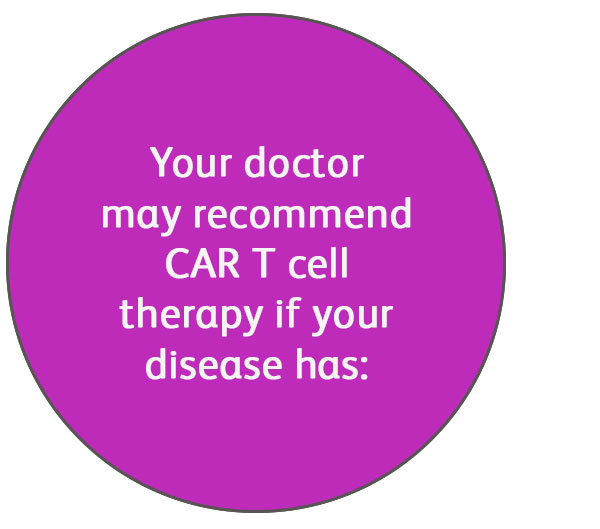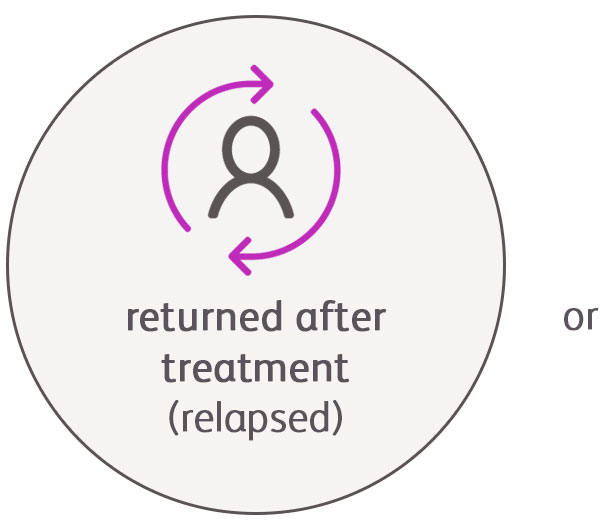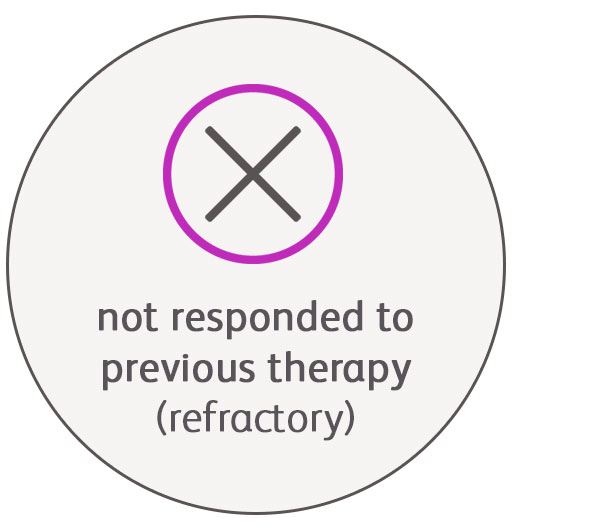- Typically spans 2–3 months
- *Includes: apheresis (removal of certain types of white blood cells from the blood), manufacturing, administration and adverse event monitoring
- Includes a short course of chemotherapy before CAR T infusion to prepare the body to receive modified cells
CAR T cell therapy patient resources
CAR T Cell Therapy Myths Debunked:
Your guide to what cell therapy is (and isn't)
Living with blood cancer can feel overwhelming, especially when it comes to making treatment decisions. It’s important to understand what cancer treatment options are available and how they differ by asking questions and working with your healthcare providers to determine the most appropriate path for you. Chimeric antigen receptor (CAR) T cell therapy is an innovative treatment that’s FDA-approved for certain blood cancers. Because of the cutting-edge science behind it, CAR T cell therapy may sometimes be misunderstood. Keep reading to learn the facts about this treatment.
Dispelling common myths about CAR T cell therapy
Science communicator & podcast host, Alie Ward, and CAR T cell therapy patient, Marilyn, break down the science behind CAR T cell therapy and share their personal experiences with the treatment.
(Alie): Hi, I am Alie Ward. I have escaped the depths of my podcast lair. I've wandered onto the streets of California, not for the beach, not for the vitamin D (although it helps).
Lower third: Alie Ward, science communicator & podcast host
(Alie): ...but we're going to be talking about something—It sounds like science fiction, but it is very real, and it is giving hope to people living with blood cancer, and it's called CAR T cell therapy. Never heard of it? A lot of people probably haven't, but don't worry; you'll know soon enough. And I'm meeting with someone who can talk about it way better than I can.
On-screen text: CAR T CELL THERAPY: MARILYN’S STORY
(Alie): I'm so excited to see you. I am always just—I have, like, so many questions. Yeah. Did you know of CAR T cell therapy before you received it?
Lower third: Marilyn, CAR T cell therapy patient
(Marilyn): Oh, I knew it was, like, a newer developing therapy for patients with blood cancers, but, really, the details I didn't know until it impacted me.
(Alie): You know, with my dad having blood cancer—He was diagnosed in 2013, and so much has happened. The fact that it's, like, real—
(Marilyn): Yeah. Yeah. Oh, it's real.
On-screen text: Blood Cancers
(Alie): So, before we dive in deeper, here is a quick refresher on blood cancers. So blood cancers start in the blood-forming tissue of the body—like, the bone marrow. And some examples of blood cancers are lymphoma and multiple myeloma and leukemia, and they can also be referred to as hematologic cancers.
Lower third: CAR T cell therapies are not approved for all types of blood cancers.
(Alie): Blood cancer runs in your family. Same with mine. When you were diagnosed, did you have any, any inkling or—
(Marilyn): I was really shocked. Yeah. And when you hear those words, ‘You have cancer,’ it's terrifying. The first time is terrifying. The second time is terrifying. I mean, it doesn't get easier; in some ways, it may—It mentally seems more scary because you start to wonder, you know, like, what are my options? I've already done these treatments, and, you know, you just really wonder. At the point I was at, it was, like, ‘Let's get you right in.’
Lower third: Always talk to your healthcare providers about your treatment options to decide what is best for you.
(Marilyn): They gave me the options, and CAR T was the best option for me. My doctor as well as my entire care team was very thorough with, like, walking me through the process.
(Alie): OK. So, in a nutshell, this is how CAR T cell therapy works. So first, these T cells—your body's immune system fighters—they're removed through a process called apheresis, or leukapheresis, and blood gets withdrawn, the T cells are removed, and then all the remaining blood gets infused back to the patient. And then the T cells go on a trip to a cell engineering lab, where they're programmed to target your cancer. So now we're going to talk about the manufacturing process. So, after collection, the T cells get shipped off to a specialized cell therapy manufacturing facility, and there they get genetically programmed to become CAR T cells. So they're armed with chimeric antigen receptors, or CARs, and they're like hooks. And these T cells can now recognize and fight target cells with a really specific surface antigen—including the bad guys, like the cancer cells. And then the new CAR T cells multiply into millions, and, before they're shipped back, they undergo really intense testing and quality control. And the whole process can take several weeks, but every step is important. And then, a few days before your CAR T cells come back, patients receive a short course of chemotherapy. It's called lymphodepleting chemotherapy. And this helps to create space in the patient's immune system to accept the CAR T cells. Now, it's infusion time. So the patient receives the CAR T cells through a one-time infusion, and the CAR T cells then start expanding and traveling throughout the body to attack the bad guys (AKA, the cancer cells).
On-screen text: CAR T CELL THERAPY PROCESS*: Apheresis --> Manufacturing --> Lymphodepleting Chemotherapy --> Infusion --> Short- and Long-term Side Effect Monitoring
Lower third: *May include bridging therapy while CAR T cell therapy is manufactured.
(Alie): So, Marilyn, I know the whole CAR T cell therapy process took a few months, but what was it actually like?
(Marilyn): Yeah, it can take anywhere from two to three months, but I wasn't in the hospital the whole time. There was a lot happening behind the scenes, and one of the best steps I took was to talk to my care team early on to learn about the whole process. My doctor shared all the information on side effects, including serious side effects such as cytokine release syndrome, neurologic toxicities and infections. So learning about them felt scary initially...
Lower third: Side effects may require treatment in the hospital; lifelong monitoring for secondary cancers is required.
(Marilyn): ...but my doctor walked me through how they plan to monitor and address any of the side effects, which was really reassuring, and just having that information on hand helped to set expectations.
(Alie): Yeah, totally. And, you know, there's another interesting thing. Recently, certain patient monitoring requirements for CAR T cell therapy were reduced, which kind of continues to break down barriers and reduce the time burden on patients and on caregivers.
(Marilyn): Oh, I completely agree. I mean, even though that change came after my treatment, it means so much for future patients and shorter time at the treatment center and less time away from home. It's just an overall smoother experience.
On-screen text: Talk to your healthcare providers about the risks and side effects.
(Alie): I just want to reinforce: so CAR T cell therapy is different than the traditional treatments because it's personalized. So your own T cells are modified to fight certain blood cancers. So it's not a one-size-fits-all approach, and there are certain risks and side effects associated with it. So make sure you speak with your care team about if this could be an appropriate fit for you.
(Alie): So, with that timeline, you get your blood cells drawn, right? And then they engineer modify them, and then, when you get them back, how did you make yourself comfortable during the treatment? Like, what little things helped you feel more at ease?
(Marilyn): When you get them back, you are in the hospital. I brought my own pillow; I brought a blanket.
Lower third: Some patients may receive CAR T cell therapy in an outpatient setting, if determined by their doctor.
(Marilyn): I brought a cover for the mattress so I would be comfortable for the time I was there. Yes. Downloaded movies. The weighted eye mask was—I can't remember who told me to bring that. I think one of my friends did, and it worked. It was great.
(Alie): Did you, you know, start a group text to say, ‘Hey, y'all—I'm going through this’?
(Marilyn): So it was more than a group text. It was having a whole care team, like all of my family and friends involved. Because when, you know, you get out of the hospital and you go home, there's certain precautions and certain rules and certain things. So, um, I had to have a village. It took a village. So I had one of my friends who’s very meticulous come up with this care calendar.
(Alie): Every friend group needs one spreadsheet girly.
(Marilyn): Yeah, exactly. It's not me. Well, I knew exactly who it was going to be, so—
(Alie): You know, um, it's really, though, an honor to be able to be there for someone who you love so much. Yeah. You know, and just trying not to cry. But when you love someone and you're seeing them struggle like that to get their health back and to go through different therapies and to try something and to have to pivot, you know, to be there by their side is—You really start to feel more like a plus-one to their treatment. Hope is such a huge part of it. And, you know, if I ever have someone in my life who, you know, is diagnosed, it's like, I think back to when my dad was diagnosed and how much, how much hope got us through and how long we had him around, you know, and how much the therapy's changed, and you kind of, you kind of have to keep yourself in that really optimistic place.
(Marilyn): Yes. Right.
(Alie): What if the best-case scenario happened?
(Marilyn): That's right. Exactly.
(Alie): You know, it's not fair to just give the worst-case scenario.
(Marilyn): Yeah. Um, and that is what I hope, honestly. Yeah. The best-case scenario. Yes.
(Alie): Marilyn, thank you so much for letting me ask you 1 billion questions and just being so open with your journey. It's so helpful for other people to hear this from someone who's been through it.
(Marilyn): You know, you're so welcome. And I just am glad that I can share my story about my CAR T cell therapy, and I just hope that it can help others.
On-screen text: Hope starts with a conversation: Ask your doctor about CAR T cell therapy.
Bristol Myers Squibb logo and end slate
Want to learn more about CAR T cell therapy?
Visit ExploreCellTherapy.com, consult your care team to see if this treatment is right for you,
or find a treatment center near you.
© 2025 Bristol-Myers Squibb Company. All rights reserved. HE-US-2500435. 10/25.
CELL THERAPY 360® and the related logo are trademarks of Celgene Corporation, a Bristol-Myers Squibb Company.






